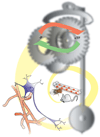Post-translational modifications in circadian rhythms
- PMID: 19740663
- PMCID: PMC2765057
- DOI: 10.1016/j.tibs.2009.06.006
Post-translational modifications in circadian rhythms
Abstract
The pace has quickened in circadian biology research. In particular, an abundance of results focused on post-translational modifications (PTMs) is sharpening our view of circadian molecular clockworks. PTMs affect nearly all aspects of clock biology; in some cases they are essential for clock function and in others, they provide layers of regulatory fine-tuning. Our goal is to review recent advances in clock PTMs, help make sense of emerging themes, and spotlight intriguing (and perhaps controversial) new findings. We focus on PTMs affecting the core functions of eukaryotic clocks, in particular the functionally related oscillators in Neurospora crassa, Drosophila melanogaster, and mammalian cells.
Figures

![Figure 2<sub>[SC1]</sub>](https://cdn.ncbi.nlm.nih.gov/pmc/blobs/1c1b/2765057/e1a140dd7f3f/nihms139004f2.gif)
References
-
- Dunlap JC, Loros JJ. How fungi keep time: circadian system in Neurospora and other fungi. Curr Opin Microbiol. 2006;9:579–587. - PubMed
-
- Hardin PE. The circadian timekeeping system of Drosophila. Curr Biol. 2005;15:R714–R722. - PubMed
-
- Ko CH, Takahashi JS. Molecular components of the mammalian circadian clock. Hum Mol Genet. 2006;15(Spec No 2):R271–R277. - PubMed
-
- Garceau NY, et al. Alternative initiation of translation and time-specific phosphorylation yield multiple forms of the essential clock protein FREQUENCY. Cell. 1997;89:469–476. - PubMed
Publication types
MeSH terms
Substances
Grants and funding
LinkOut - more resources
Full Text Sources
Molecular Biology Databases
Miscellaneous

